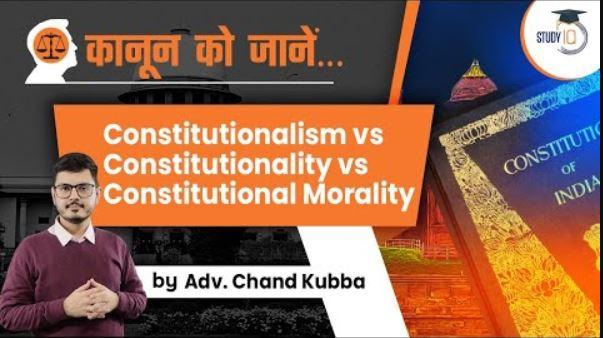Constitutionality- संवैधानिकता
- Being in accordance with the provisions of a constitution or Adherence to the Constitution.
- When laws, procedures, or acts directly violate the constitution, they are unconstitutional.
- E.g. Constitutionality of Section 124A IPC is Challenged or Constitutionality of Marital Rape Law is challenged
Constitutional Morality-संवैधानिक नैतिकता
- Constitutional Morality means adherence to or being faithful to bottom line principles of constitutional values.
- In the context of constitution of India, the constitutional values are Democracy, Socialism, Equality and Integrity etc.
- Briefly it is the preamble which clarify the constitutional values.
- The phrase ‘constitutional morality’ is also a making-of judicial interpretation, and the phrase doesn’t appear explicitly within the Constitution.
- Many a times a political functionary has to use his discretionary powers to while exercising his duty because of the lack of guidelines on that subject.
- Here Constitutional morality comes in to picture.
- He is supposed to follow the implicit guidelines of the Constitution, where the Explicit guidelines are missing.
- Even if the Constitution gives absolute freedom to a political functionary, it does not mean that he can use his powers according to his whims and fancies.
- This principle of Adherence to the essence of Constitution is what is called Constitutional Morality or Positive Morality.
- constitutional values are to be found in The preamble of the constitution which declares ideals and aspirations of the constitution, and it is also to be found in part III of the Constitution of India i.e. Fundamental Rights
- InManoj Narula v. Union of India, the Supreme Court dealt with a point of great public importance as to the legality of the person with criminal background and charged with offences involving moral turpitude being appointed as ministers in central and state governments.
- “As the Debates in the Constituent Assembly would show, after due deliberation, they thought it appropriate to leave it to the wisdom of the Prime Minister because of the intrinsic faith in the Prime Minister. At the time of framing of the Constitution, the debate pertained to conviction. With the change of time, the entire complexion in the political arena as well as in other areas has changed.
- It would be apt to say that when a country is governed by a Constitution, apart from constitutional provisions, and principles constitutional morality and trust, certain conventions are adopted and grown.”
Constitutionalism-संविधानवाद
- means limited government or limitation on government. It is antithesis of arbitrary powers.
- Constitutionalism recognizes the need for government with powers but at the same time insists that limitation be placed on those powers.
- The antithesis of constitutionalism is despotism. A government which goes beyond its limits loses its authority and legitimacy.
- Therefore, to preserve the basic freedoms of the individual, and to maintain his dignity and personality, the Constitution should be permeated with ‘Constitutionalism’; it should have some inbuilt restrictions on the powers conferred by it on governmental organs.
Louis Henkin-
defines constitutionalism as constituting the following elements:
(1) government according to the constitution;
(2) separation of power;
(3) sovereignty of the people and democratic government;
(4) constitutional review;
(5) independent judiciary;
(6) limited government subject to a bill of individual rights;
(7) controlling the police;
(8) civilian control of the military; and
(9) no state power, or very limited and strictly circumscribed state power, to suspend the operation of some parts of, or the entire, constitution.
Download | Free PDF






















 WhatsApp
WhatsApp